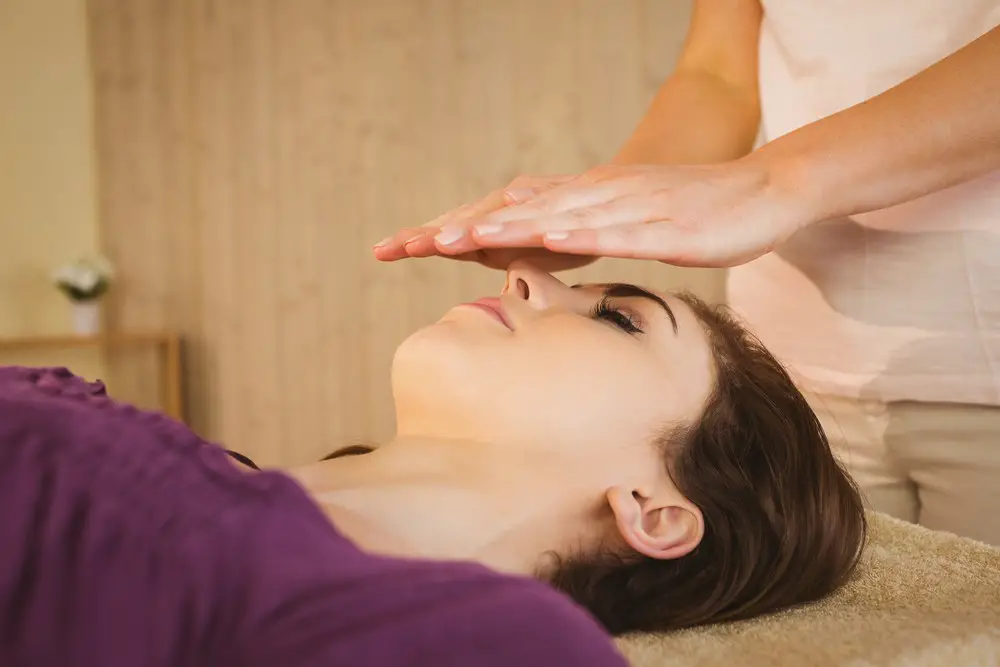As a BetterHelp affiliate, we receive compensation from BetterHelp if you purchase products or services through the links provided
Reiki, a Japanese healing technique, is one of the best-known touch therapies accepted worldwide as a complementary therapy. Practitioners maintain that it heals many ailments, including relief of chronic pain, stress, and anxiety. This article takes a deeper look into how Reiki can help.
Reiki – Delivering Energy to The Body
Reiki promotes relaxation and alleviates stress and anxiety through the energy from touch. As the reiki practitioners use their hands on the body, a flow and balance support the healing process.
Mikao Usui developed the healing technique early in the 1900s. The term comes from the Japanese word that means universal (rei) and ki, the vital life force energy found in every living thing. The concept behind it is creating energy balances within the body, helping it physically, emotionally, mentally, and spiritually, without enforcing any particular religious calling.
Principles of Reiki for Deeper Empowerment
Five Reiki principles are easy to incorporate into anybody’s life. These complement the reiki sessions, allowing patients to embody the treatment to alleviate their stress and anxiety. Namely, don’t worry, don’t get angry, and be humble, honest, and compassionate to everyone, including yourself.
Frequency of Reiki Required
The frequency of reiki sessions required always depends on the individual and their degree of stress and anxiety. In most cases, according to Anxiety.org, once a month is enough, but some people need to attend sessions more frequently to start with, helping them to release pent-up stress.
Demonstrated Effects of Reiki on Stress and Anxiety
There are not many published research results available on Reiki’s effectiveness. The Center for Reiki Research conducts research through their “Touchstone Process,” using a rigorous peer-review method and best practices for scientific reviews before analyzing the results.
The studies reviewed by the Touchstone Process have led to some positive conclusions about Reiki’s effectiveness on physical and mental health. In addition, some studies are conducted on animals to eliminate bias.
Psychcentral reports that 20.27% of study groups used the word “stress” to describe their condition when they entered study groups for the effects of reiki treatments. Furthermore, animal studies showed that reiki treatments showed reduced stress as seen by changes in the animals’ heart rates.
In another study of nurses showing signs of burnout, the reiki treatment improved their relaxation response. These are just a sprinkling of the results from studies; others show improved long-term relief from mild depression and stress after just six weeks of Reiki, and the effects last for up to a year. For example, a 1998 study found that Reiki eliminates post-heart surgery depression.
Chronic pain leads to depression and anxiety. Reiki is an effective way to reduce pain, helping to alleviate these stresses.
How Reiki Works
During a reiki session, the body enters a meditative state, bringing peace, relaxation, and a general feeling of wellness. The benefits of this include healing of bone and tissue injuries, a stimulated immune system, and pain and tension relief.
Reiki is not designed to replace traditional treatments but complements them perfectly. Therefore, patients with existing problems should continue consulting with their physician or psychologist. However, anyone in good health can use Reiki to enhance their ability to reduce stress and preventative treatment.
Reiki sessions are typically about 50-minute long. You remain fully clothed during the session, and the practitioner uses the palms in their various hand positions. The energy does not always require the hands to touch the body; as the energy flows, your body takes what it needs. Therefore, no manipulation is required and no pressure like those used in various massage techniques.
During a reiki session, people have different sensations, so expect to feel pulsing, heat, or tingling in the areas where the reiki practitioner lays their hands. However, you don’t need to feel anything other than relaxed and peaceful. It’s okay if you fall asleep during the session; this is normal.
During your Reiki session, your body shifts from its fight-or-flight mode into a rest and digest mode or parasympathetic mode, known as the Relaxation Response. When you are in this state, your body heals and releases tension.
Last Take
Responses to reiki sessions vary from person to person, but everyone agrees that they have a sense of deep relaxation and peace once finished. They report that their focus shifts away from the stress and anxiety in their bodies and allows them to enjoy a good night’s sleep and other pleasures. One of the benefits of Reiki is that people often learn to practice it on themselves, allowing them to provide self-care between sessions with some positive reiki energy. Therefore, Reiki is an excellent way to cope with stress and anxiety.
- 3 Ways Wearing a Hat Can Help Lower Your Stress Levels - April 19, 2025
- Breaking the Silence: Why Men’s Mental Health Matters More Than Ever - April 15, 2025
- How to Transform a Home’s Patio Space into a Relaxing Space - March 23, 2025
This site contains affiliate links to products. We will receive a commission for purchases made through these links.



